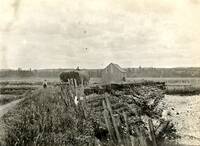
Departures: May to September 2026 & 2027
from £4,749 pp.
Book your holiday today:
Within GB: 01580 214 089 • International: +44 (0)1580 214 089
Planning a Canadian motorhome holiday is surely incomplete without diverting to a UNESCO site or two. On our Maritime Hidden Gems motorhome holiday, you visit three of Canada's 20 UNESCO sites. In this article, we look at the Grand-Pré site, a rural community in Kings County, Nova Scotia.
Grand-Pré is a testament to the rich history and resilience of the Acadian people. Its French name translates to "Great/Large Meadow," and the community lies at the eastern edge of the Annapolis Valley, framed by the Gaspereau and Cornwallis Rivers. The community was made famous by Henry Wadsworth Longfellow's poem Evangeline and is today home to the Grand-Pré National Historic Site. On June 30, 2012, the Landscape of Grand Pré was named a World Heritage Site by UNESCO.
Sorry, this map cannot be displayed.
The following consent is required:
Tracking & performance, Targeting & advertising.
Grand-Pré was founded in about 1680 by Pierre Melanson and Pierre Terriot. The settlers quickly employed their dyke building technology to the vast salt marshes, effectively reclaiming several thousand acres of productive farmland. The farms and the population grew quickly, making Grand-Pré the principal settlement in Acadia.
During Queen Anne's War, New Englander Ranger Benjamin Church burned the village and broke some of the dykes in the Raid on Grand Pré. During King George's War, a French force led by Jean-Baptiste Nicolas Roch de Ramezay defeated a larger British force in a night raid at the Battle of Grand-Pré. This battle was the most significant and bloodiest victory for the French in Acadia.

During the French and Indian War, the Acadians were expelled from Grand-Pré during the Bay of Fundy Campaign (1755). American poet Henry Wadsworth Longfellow later immortalised the site of Grand-Pré during the expulsion with his epic poem Evangeline. Acadians from Grand Pré were dispersed in many locations, and some eventually returned to other parts of the Canadian Maritimes, such as Nova Scotia, Newfoundland, and New Brunswick.
Many Acadians expelled from the Grand-Pré area eventually settled in the New England States and travelled overland to South Louisiana in the United States after being dropped on the Atlantic coast. In Louisiana, the term Cajun evolved from the name Acadian.
Today, Grand-Pré stands as a symbol of Acadian resilience and cultural preservation. The community is home to the Grand-Pré National Historic Site, a national park administered by Parks Canada that commemorates the Acadian people and their deportation. This site offers visitors a chance to step back in time and immerse themselves in the rich history and culture of the Acadian people.
One of the notable landmarks in Grand-Pré is the Covenanter Church, the oldest existing Presbyterian church in Nova Scotia. This historic church is a testament to the region's religious history and diversity and continues to be a place of worship and community gathering.

Grand-Pré is also known for its thriving wine industry. One of Nova Scotia's best-known wineries,
Domaine de Grand Pré, a family-owned winery, was established in 1994 by Swiss immigrant Hanspeter Stutz and his family. The winery, located on the oldest farm winery site in Atlantic Canada, is a testament to the Stutz family's passion for Nova Scotia's unique wine and food culture. After opening its doors in 2000, the winery has offered a distinct Nova Scotia wine experience with its lush gardens, well-tended vines, and the inviting Le Caveau restaurant. Visitors to Grand-Pré can enjoy a tour of the vineyards, wine-tasting sessions, and even dine at the winery's restaurant, offering a unique gastronomic experience.
Grand-Pré is also Canada's first designated Historic Rural District, a testament to its historical significance and the efforts to preserve its cultural heritage.
For nature lovers, Evangeline Beach is a must-visit. The beach is a famous stopover for thousands of migrating shore birds. It's also a fine vantage point for watching the ebb and flow of the world's highest tides, offering a unique natural spectacle that will captivate you and offer fantastic photo opportunities.
Powerful Acadian stories within a picturesque landscape that demonstrate successes and struggles are illuminated through multimedia presentations, engaging displays, a splendid Victorian garden, and a Memorial Church.
You can explore the Grand-Pré National Historic Site on a guided tour with a Parks Canada interpreter, offering an immersive and educational experience. For those seeking a unique overnight experience, the site offers the opportunity to camp in an oTENTik, a unique accommodation option that combines the comfort of a cabin with the adventure of a tent right in the heart of this UNESCO World Heritage Site.
The site is also the starting point of the Harvest Moon trail, a 110 km cycling and walking trail linking Grand-Pré to Annapolis Royal. This trail offers a distinctive way to explore the region's stunning landscapes and delve deeper into its rich history.
There are also special events that take place throughout the year, some of which include:
Acadian Days at Grand-Pré 2023 This annual festival, scheduled for 14-16 July 2023, brings together many Acadians to celebrate and share their culture and history with tourists and the local community. Société Promotion Grand-Pré organises the event and includes various programs highlighting Acadian culture.
Day of Commemoration of the Great Upheaval On July 28, 2023, visitors can pay tribute to Acadian ancestors by discovering the lives of Jeanne Dugas, Madeleine Babin, Germain Boudrot, and Catherine Bro. The event includes a tour of significant sites and is presented by Les Amis de Grand-Pré.
National Acadian Day On August 15, 2023, the site hosts a day of entertainment, music, and a fun Tintamarre parade to celebrate Acadian culture. The event is presented in collaboration with Société Promotion Grand-Pré.
Reading of the Deportation Order On September 5, 2023, visitors can listen to the tragic words read to the imprisoned men in the church on September 5, 1755. The event is presented by Les Amis de Grand-Pré.
The journey through the Maritimes is not just about exploring the stunning landscapes and enjoying the unique experiences; it's also about delving into the rich history and heritage of the region. Visiting Grand-Pré offers a unique opportunity to step back in time and understand the resilience and spirit of the Acadian people. Find out more on how to experience this incredible UNESCO site by talking to our expert motorhome holiday team, who can build you the holiday of a lifetime.



Peter Stannett
Content Writer
Peter is our content writer and SEO specialist, helping keep our content current and monitoring website traffic.
His content covers all four corners of the globe, across topics like activities, advice, food, culture and history.
More by Peter Stannett